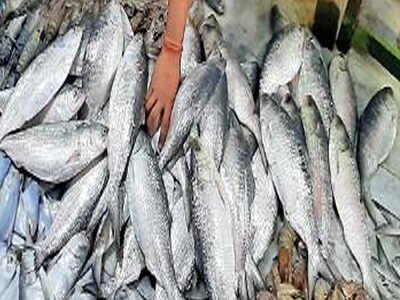Neighbour’s envy no more: 1,450 tonnes of hilsa on way to West Bengal as Bangladesh lifts export ban

KOLKATA: In less than a week, fish lovers in the city can load their shopping bags with the most coveted catch of the season at their local markets. A huge consignment of ‘Padmar ilish’ is on its way from Bangladesh to satiate cravings this side of the border and cool sizzling rates.
The Sheikh Hasina government on Friday temporarily lifted the ban on hilsa exports to Bengal and paved the way for transport of the largest consignment of the pricey fish across the border since 2011. The neighbour had banned the export in July 2012.
“The Bangladesh commerce ministry has allowed nine companies to export 1,450 tonnes of hilsa to West Bengal. The exports have to be completed by October 10 before the fishing ban kicks in from October 12,” said Kazi Abdul Mannan, director of Seven Star Fish Processing Ltd, one of the Bangladeshi firms that has received permission to export 175 tonnes.
An application has already been sent to the Centre for its nod to the import, said Syed Maqsood Anwar, secretary of the Fish Importers’ Association and the Howrah Wholesale Fish Markets’ Association. “We expect the nod by Monday, following which the first truck carrying six tonnes should arrive on Wednesday,” he said.
The lifting of the ban couldn’t have been timed better as the hilsa catch has been extremely poor in Bengal this year. The scenario is just the opposite in Bangladesh, where an abundant catch has led to a glut, bringing down prices.
Fish traders in Bangladesh had lobbied the Hasina government for lifting the export ban, and the government, though it had contemplated it, ultimately settled for a temporary concession, sources said.
Dhaka had made a small concession last year too. In what was touted as ‘hilsa diplomacy’, 500 tonnes of the fish had arrived ahead of the Bangla PM’s visit to India for bilateral talks with Indian counterpart Narendra Modi.
Bengali’s favourite fish has often been used as a handy diplomatic tool. During her first stint as PM, Hasina had sent over a consignment to then Bengal CM Joyti Basu ahead of the Ganga water-sharing treaty. But in 2012, she banned hilsa export shortly after Mamata Banerjee opposed the Teesta water-sharing pact. Prior to that, Bengal imported nearly 6,000-7,000 tonnes of hilsa every year.
The arrival of the much sought-after fish in large quantities is poised to bring down the sizzling rates in Kolkata, where ‘Gangar ilish’ weighing over 1kg, is currently retailing at over Rs 1,700/kg. Even the frozen variety from Myanmar, not a connoisseur’s choice, is fetching over Rs 1,200/kg.
Fish industry sources said hilsa production in Bengal has dwindled from 80,000 tonnes in 2001 to 10,000 tonnes in 2017, largely because of over-fishing in the Bay of Bengal. Bangladesh has been able to check this decline by banning fishing during the breeding period and establishing sanctuaries for the fish.
The Sheikh Hasina government on Friday temporarily lifted the ban on hilsa exports to Bengal and paved the way for transport of the largest consignment of the pricey fish across the border since 2011. The neighbour had banned the export in July 2012.
“The Bangladesh commerce ministry has allowed nine companies to export 1,450 tonnes of hilsa to West Bengal. The exports have to be completed by October 10 before the fishing ban kicks in from October 12,” said Kazi Abdul Mannan, director of Seven Star Fish Processing Ltd, one of the Bangladeshi firms that has received permission to export 175 tonnes.
An application has already been sent to the Centre for its nod to the import, said Syed Maqsood Anwar, secretary of the Fish Importers’ Association and the Howrah Wholesale Fish Markets’ Association. “We expect the nod by Monday, following which the first truck carrying six tonnes should arrive on Wednesday,” he said.
The lifting of the ban couldn’t have been timed better as the hilsa catch has been extremely poor in Bengal this year. The scenario is just the opposite in Bangladesh, where an abundant catch has led to a glut, bringing down prices.
Fish traders in Bangladesh had lobbied the Hasina government for lifting the export ban, and the government, though it had contemplated it, ultimately settled for a temporary concession, sources said.
Dhaka had made a small concession last year too. In what was touted as ‘hilsa diplomacy’, 500 tonnes of the fish had arrived ahead of the Bangla PM’s visit to India for bilateral talks with Indian counterpart Narendra Modi.
Bengali’s favourite fish has often been used as a handy diplomatic tool. During her first stint as PM, Hasina had sent over a consignment to then Bengal CM Joyti Basu ahead of the Ganga water-sharing treaty. But in 2012, she banned hilsa export shortly after Mamata Banerjee opposed the Teesta water-sharing pact. Prior to that, Bengal imported nearly 6,000-7,000 tonnes of hilsa every year.
The arrival of the much sought-after fish in large quantities is poised to bring down the sizzling rates in Kolkata, where ‘Gangar ilish’ weighing over 1kg, is currently retailing at over Rs 1,700/kg. Even the frozen variety from Myanmar, not a connoisseur’s choice, is fetching over Rs 1,200/kg.
Fish industry sources said hilsa production in Bengal has dwindled from 80,000 tonnes in 2001 to 10,000 tonnes in 2017, largely because of over-fishing in the Bay of Bengal. Bangladesh has been able to check this decline by banning fishing during the breeding period and establishing sanctuaries for the fish.

Coronavirus outbreak
Trending Topics
LATEST VIDEOS
City
 On cam: Navy veteran brutally beaten up by Shiv Sena goons for satirical WhatsApp forward
On cam: Navy veteran brutally beaten up by Shiv Sena goons for satirical WhatsApp forward  Delhi: International drug racket busted; Kingpin nabbed, Rs 90 crore worth heroin seized
Delhi: International drug racket busted; Kingpin nabbed, Rs 90 crore worth heroin seized  SSR death probe: Drugs were sent through courier from Sushant's house to Rhea's during lockdown
SSR death probe: Drugs were sent through courier from Sushant's house to Rhea's during lockdown  Sushant Singh Rajput is ‘beta’ of Bihar: Devendra Fadnavis
Sushant Singh Rajput is ‘beta’ of Bihar: Devendra Fadnavis
More from TOI
Navbharat Times
Featured Today in Travel
Get the app





